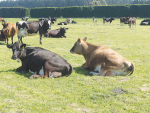The rural sector doesn't deserve admiration and respect. It must demand it by telling its story.
I was recently shown research in which New Zealanders were asked to name traits they admired about New Zealand culture. People said things like hardy, innovative, friendly and easy-going. They were also asked to name traits associated with the rural sector. The two sets were almost a perfect match.
The things New Zealanders love most about our culture are the things that the rural sector has in spades. So why isn't the sector loved? Why does it seem like the work of the rural sector is being slowly asphyxiated by the pillow of urban feelings?
It's relatively simple; most New Zealanders don't see or know what rural people and industries are like and the rural sector doesn't have the boldness to tell them.
You see, there's one factor that has changed about modern culture; humility. The rural sector has heaps of it. The modern world of selfies and sexting has very little.
In the modern world feelings matter more than fact. Being offended is offered greater speaking rights. Trivial incidents become epic tragedies.
Modesty does not win the battle for respect, policy, or money. Those who hide their light under a bushel have it extinguished by lack of oxygen.
Late last year we witnessed what should be the future for a rural sector cultural resurgence.
The campaign by SAFE to criticise treatment of bobby calves created a real risk that vegan idealogs and animal rights activists would give regulators the impression that calf mistreatment was widespread and that the public couldn't tolerate realities of farming.
It finally sparked the dairy sector into action. Hundreds of farmers and supporters took to social media in their own version of an impromptu 'Arab spring'.
They flooded comment sections of news sites, they set up Facebook pages, set up online petitions, and they posted photos and video from their farms that showed vastly different scenes from those used by SAFE.
The result was a wave of honest, ordinary expression that was powerfully persuasive. Farmers and families posted videos and photos that proved the affection and appreciation farmers have for their stock. Comments, and some video, were so raw in anger at SAFE that the public could not mistake the extent to which farmers believed the SAFE campaign differed from the reality.
A recent issue of New Scientist carried a feature about the psychology behind how we are affected by real-life stories. The more palpable the reality – with personal detail that we can relate to – the more we believe it.
That's why New Zealanders were taken with the real stories of dairy farmers working alongside their animals.
It was also the passion with which these stories were told. A key factor in how each of us assesses social norms is the volume of their expression. Even one person, shouting loudly and often, can give an impression that their opinion is commonly shared. That's why activists appear to make headway.
With bobby calves it was different. Farmers told their stories passionately, and in numbers.
That emboldened New Zealanders to keep hold of their common sense on the matter.
They realised farmers were decent and respected their animals, but that there was also a job to do to get food on our table and exported.
That research showed New Zealanders can and do admire the rural sector. But we can't rely on them to think or say so automatically anymore.
You'll have to take a selfie to remind them.
• Mark Blackham is a director at BlacklandPR is a Wellington-based public relations consultancy with primary sector expertise and interest.


















